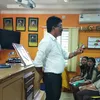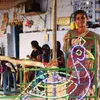This ex-lawyer is making life meaningful for intellectually-disabled children in Trichy
Selvarani Rajaratnam started a school for intellectually disabled children in Tiruchirapalli, where she and her team train these children to be fit both physically and mentally.
Twenty-eight years ago, in 1993, in the ancient temple town of Tiruchirapalli (Trichy), Tamil Nadu, a good Samaritan named Selliah quietly founded a non-profit organisation (NGO) that worked relentlessly for the development of the rural poor, women, children, and tribes in Trichy and Perambalur’s drought-prone areas.
Selliah had a daughter, Selvarani Rajaratnam, who grew up to be a practising lawyer, married a cardio-thoracic surgeon, Dr N Rajaratnam, and settled in Dubai for many years. But, in a cruel twist of fate, Selvarani lost both her father and husband to untimely deaths.
Although she continued to practice law despite the tragedies, she eventually decided to fulfil her husband’s wish. She returned to India in 2006, took over the reins of the NGO, and named it Sri Selliah Memorial Trust (SSM Trust) after her father.
In 2009, during one of her visits to a nearby village to meet women self-help groups, she came across an intellectually disabled girl tied to a pillar in front of her house. Selvarani tells SocialStory -
“She was standing with her skirt raised above her waist after toileting, not knowing what to do. Her mother, a daily wager, had gone to work as she had to make ends meet in order to sustain the family, and had tied her up out of helplessness.”
Selvarani felt distressed seeing the helpless 16-year-old, and felt the urge to do something. She set up the Sri Selliah Memorial Special School for Intellectually Disabled Children in the same year and enrolled the girl as one of the first students. She was with them until about the age of 20, but after returning to her home, she passed away at the age of 21.
“I started off with about five children at the school, now we look after about 31 children up to the age of 18,” she says.

Selvarani with the children
A school for the intellectually disabled
Selvarani runs the school with the help of two educators who have specialised in Special Education, one physiotherapist, two trained teachers who work part time doing admin work as well, a programme officer, a coordinator, a caretaker, two helpers or aayas who help the students in personal hygiene, since they are dependent on others for it.
“This is the situation in severe cases. In moderate cases, we teach the children how to be independent. While we used to have a few severe cases, we do not anymore because it became difficult for the Aayas to carry them to the washroom,” Selvarani shares.
Her team also has two drivers who pick up children from about 40 villages in Trichy and Perambalur. They start their day at 7 am and travel about 460 kilometres a day for the same, in two different directions.
Each of the staff members were selected based on their patience and service-minded attitude, rather than their qualifications.

Selvarani's team at the SSM school
Selvarani says if not in school, these children are left to tend to themselves and roam around the village during the day. In fact, one of the students, Santhosh would roam around wearing only his shirt. The team had to sit him down and explain to him the importance of dressing and trained him to always wear his shorts. The staff also teach students basic skills like brushing their teeth, combing their hair, wearing clothes, how to keep clean, etc.
The students also learn to identify and match shapes and colours and name them in Tamil. In addition, they are also taught sign language for easier communication. The school even conducted a test for some of the students who were able to take it up.
“Our main aim is keep them happy and engaged with other children of their age. At home, they would often be by themselves as everyone would have their own work to do. Now these children are even asking their parents for bags and books, and are so proud that they are also able to go to a school like the other children,” narrates Selvarani.

The staff members feed the children in certain cases
After the age of 18, the children either go back to their homes, if parents are willing to care for them, or else they are taken into care homes. But some children also manage to get jobs like envelope making, garland making, etc., for which the government supports them with about Rs 2000.
During the pandemic, the school was shut for the children, however, the team made it a point to regularly visit their homes to check on them. Food packets were also distributed to the children.
Despite the difficult times, the staff are still working without pay out of loyalty. Selvarani acknowledges that all the good work they do is a team effort, and says it will be difficult for her to find another set of employees who can work with the same dedication.
Impact
Besides skills training, the school also provides physiotherapy sessions for many children, who have developed their physical health as a result. One child, Sabari, used to crawl when he joined the school. He can now easily cycle any distance without any difficulties. Like Sabari, many other students have transitioned from crawling to walking after coming to school.
The students are taught dance, yoga and other kinds of physical activities like gardening and sports. They have even participated and won medals in the district level sports events in the special category.

A yoga session held at the school for the children
The school has so far helped over 50 students since 2009, some of whom have even gone on to be a part of regular school. A few older children now work in the village, and some have taken to farming, to the extent that their physical capabilities allow them.
Selvarani has been bootstrapped in her efforts, while some donations came in from friends and family. A month’s care for each child can cost up to Rs 7500, and a little of this is covered by the government. Sadly, there has been little to no funds available for employee salary in these difficult times. So, she started a fundraiser on the crowdfunding platform, Milaap, in order to pay the staff, take care of the institution and safeguard the children.
“If I can raise a good amount of money and deposit it in the bank, I want to run the organisation with the interest amount so that it can be sustained. This is the sole challenge I am facing. Everything else is a dream come true with the amazing support I have from my team,” Selvarani shares.
The way forward
“My biggest wish is to be able to provide them with nutritious food, which can improve their health and life span, which is otherwise about 25-30 years, and can go up to 35 years if they are healthy,” says Selvarani.
Selvarani wants to provide the children with milk, eggs and wholesome meals once they return to school.
In the long term, she wants to provide them with uniforms, bags, books and other stationery, and also set up a play area for them. She also plans to open a residential setup near the school for these children, so as to take care of them after the age of 18, if the funding permits.
“The first goal is to sustain the school, and with every passing month, improve the facilities and make it a fulfilling and gratifying experience for the children,” she concludes.
Edited by Anju Narayanan









